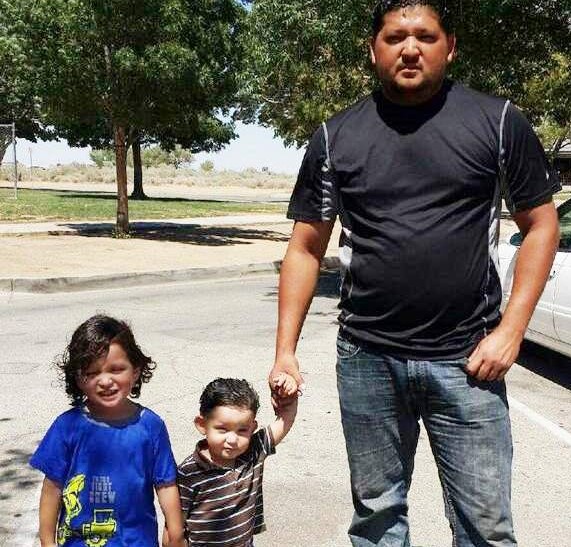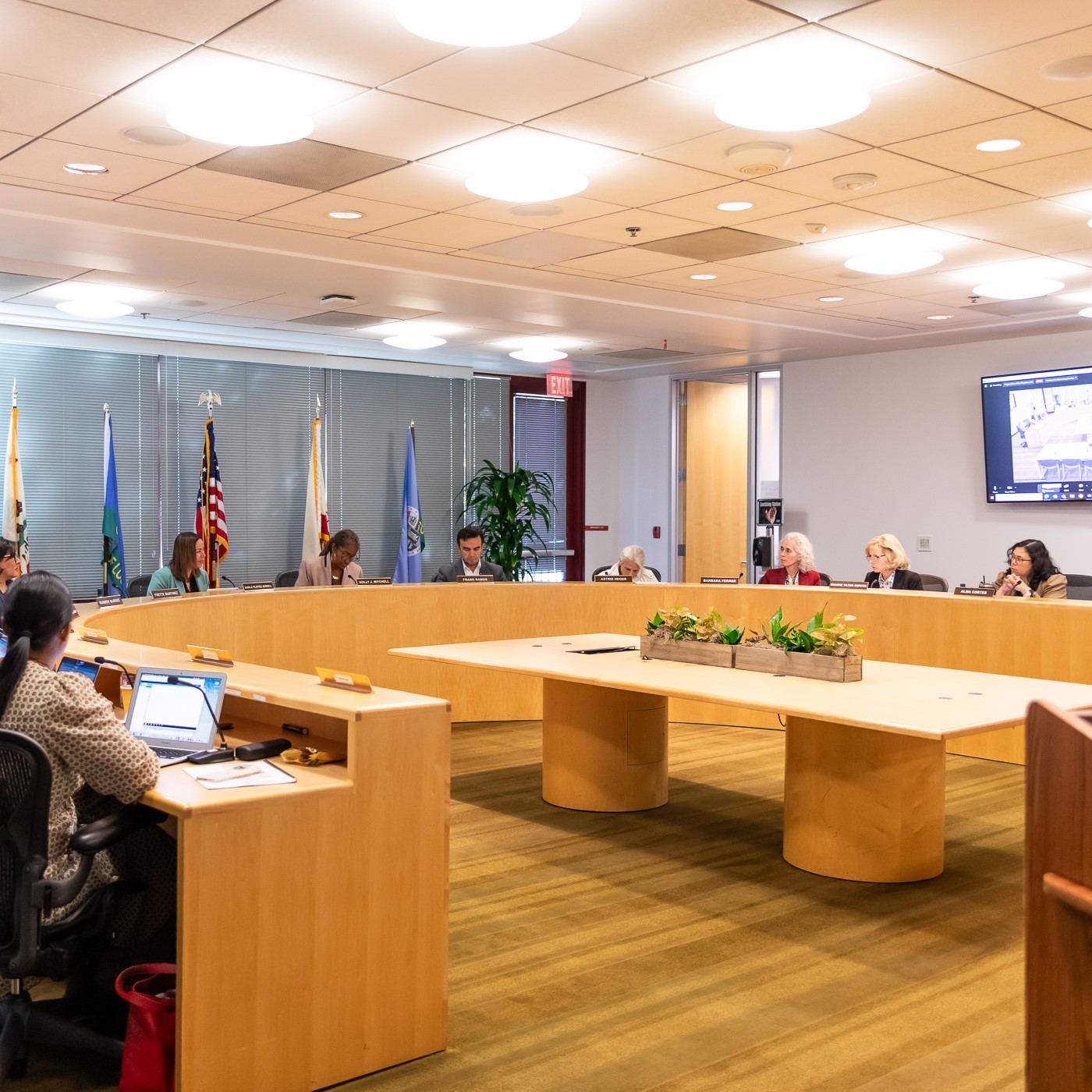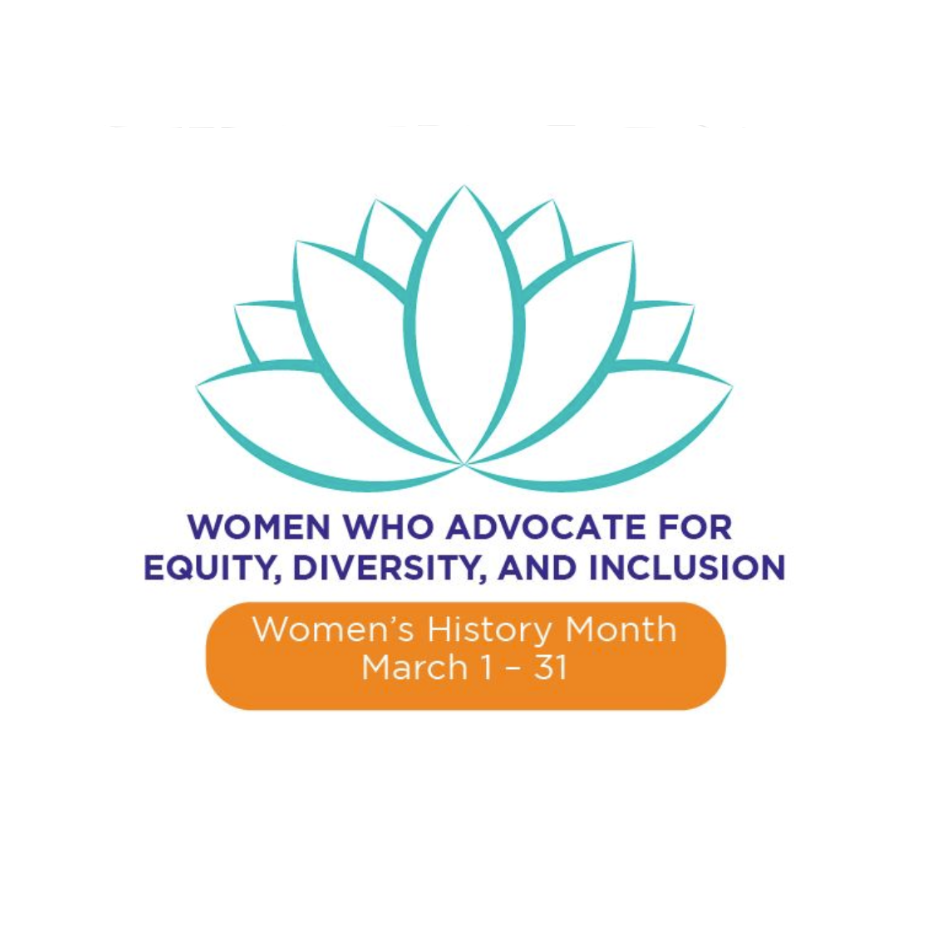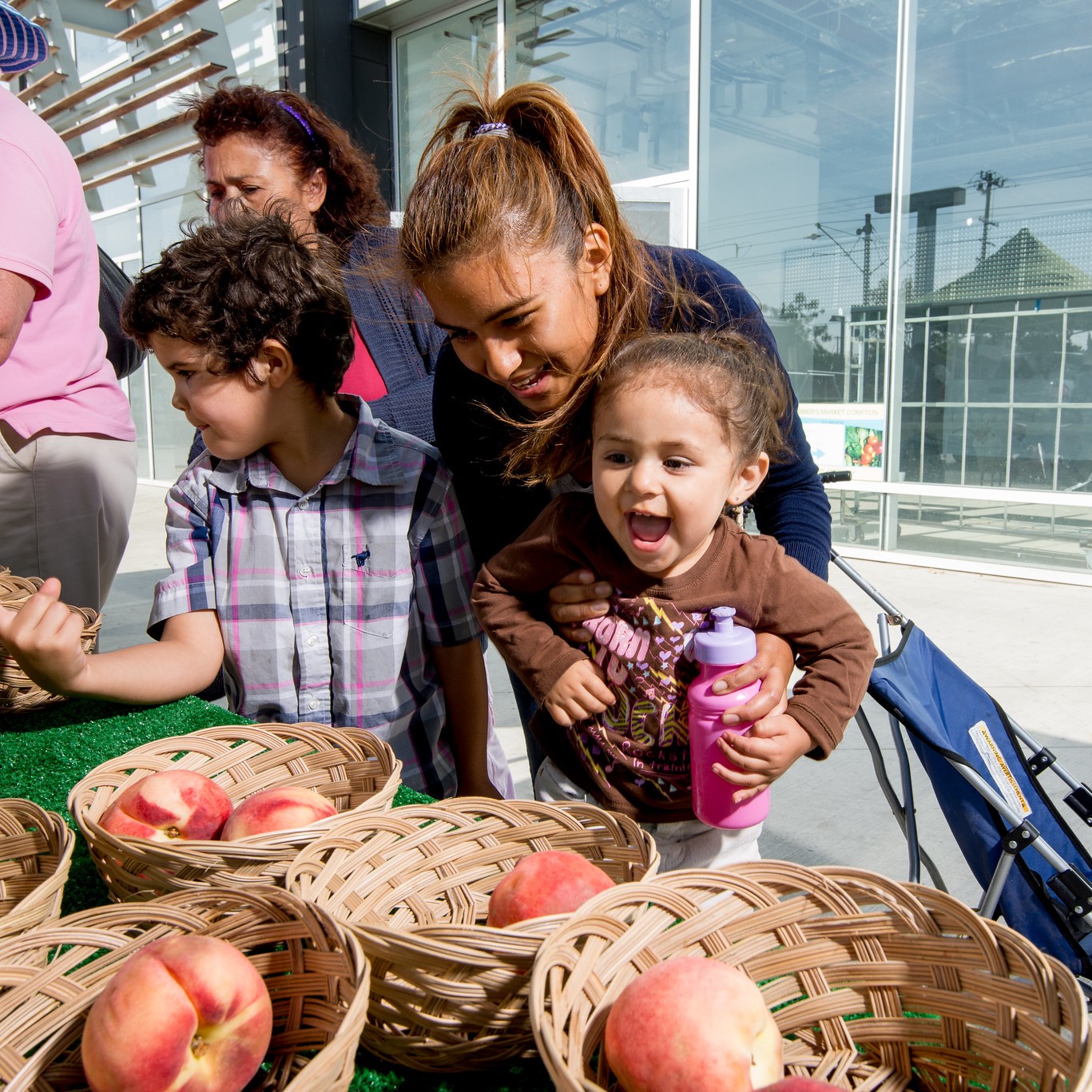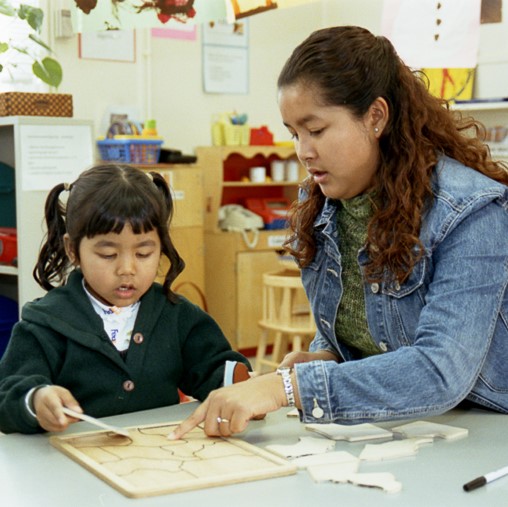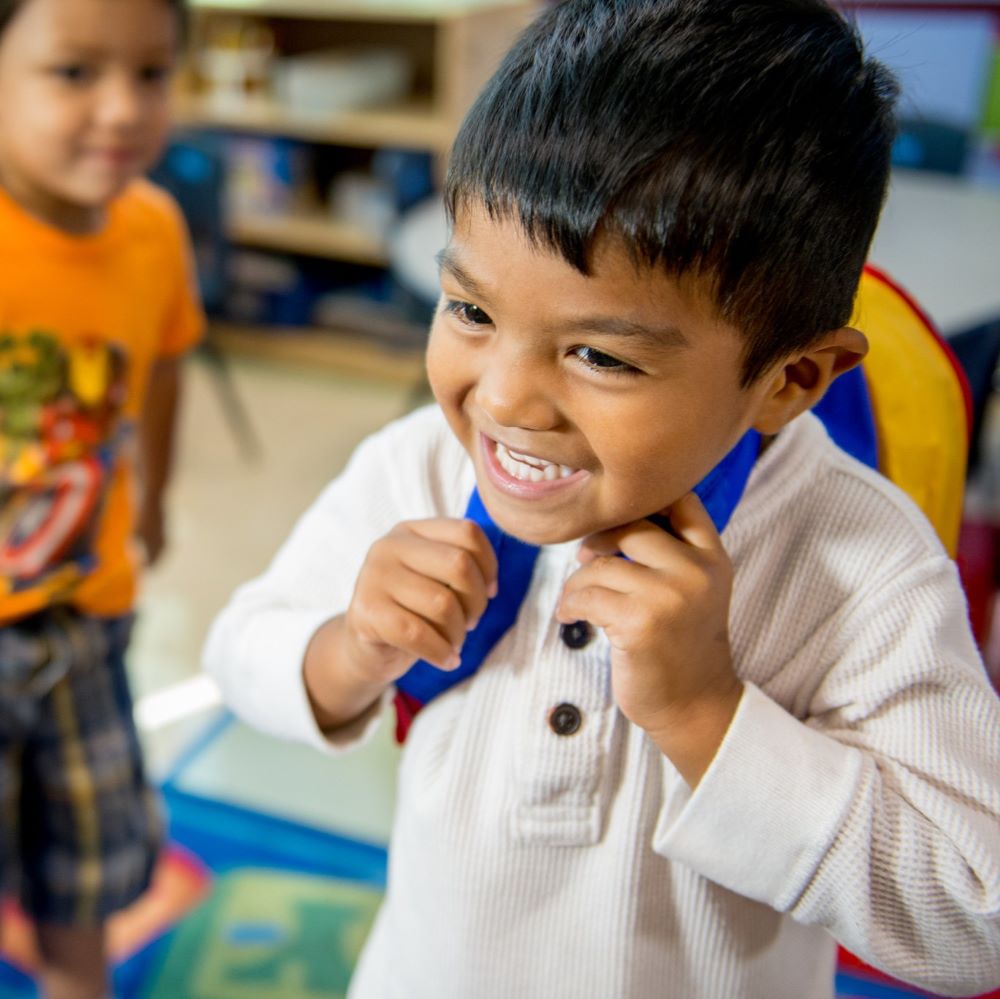A little boy who hates school gains new sight and insight. A mother of a baby girl with Down syndrome is uplifted by caring professionals. A single father learns from others how to be a better parent himself . . . then returns the favor.
As a gift to our newsletter readers this holiday season, First 5 LA is sharing a heartwarming handful of the many success stories achieved through First 5 LA advocacy, programs and funding during fiscal year 2015-2016.
So grab a mug of eggnog or champurrado, sit back, and enjoy.
With Help From Others, A Single Dad Becomes the Parent He Never Had
When Miguel Ramirez was only 3 months old, war in El Salvador forced his mother to hand him over to his grandmother for care. Growing up, he only had a photo of her to remember her by. He also was unable to develop a strong relationship with his father, who visited Miguel only once a month.
Later, as an adult, Miguel became a parent himself. But life’s unexpected twists would continue.
“Miguel was enthusiastic and helpful, staying through the entire day and assisting with teardown.” -?Aymee Aguilar
Recently, the two separate mothers of Miguel’s two sons each walked away, leaving this Panorama City father to raise a 2-year-old and 3-year-old alone.
Now a single parent, Miguel wanted to ensure a better life experience for his children, but he did not know where to look for parenting help in his community.
Fortunately, Miguel’s community was looking for parents just like him.
Last spring, Miguel was introduced to Friends of the Family (FOF) a family resource center in North Hills that supports parents in raising young children. He began to learn about parenting and, shortly afterwards, offered to volunteer at a resource fair sponsored by the the Building Stronger Families in Panorama City and Neighbors (BSFPCN) program.
As part of an effort to target socially isolated families, the First 5 LA-funded Best Start Panorama City and Neighbors Community Partnership developed the BSFPCN program.
Through resource fairs, parent cafés and other outreach efforts, the BSFPCN program provides opportunities for parents of children prenatal to 5 to make connections with others and learn how to find information and services to help families raise young children. FOF implements various activities in the BSFPCN project.
Said FOF Project Coordinator Aymee Aguilar: “Miguel was enthusiastic and helpful, staying through the entire day and assisting with teardown.”
Miguel expressed that he had never been part of any event nor felt part of anything, but that, on that day, he felt that he belonged to a community. Said Miguel: “Thank you for giving me the opportunity to help, be part of something so important and for making me feel that I am a worthy human being.”

That taste of worthiness grew into a hunger to connect with – and ultimately help – others.
At the resource fair, Miguel was introduced to a multitude of agencies providing parental resources and activities for children – perfect for helping him get connected to his community. He began attending meetings of the Best Start Panorama City and Neighbors community partnership.
Through these encounters with other parents, Miguel shared that he was going through challenges and felt alone. But he realized from talking to others there that they were also struggling.
Inspired by this, Miguel applied for and was selected as a candidate to become a Parent Resource Liaison for the Best Start Panorama City and Neighbors Community Partnership. Over the next few months, Miguel committed 144 hours to the Parent Resource Liaison training program that developed his ability to be a go-to person providing support for many difficult-to-reach families in the community. He graduates from the training program this month.
“It helped me and my kids be more compassionate and understanding of each other, he said. “I have a better relationship with my kids.” -Miguel Ramirez
“Miguel’s story provides a lens to community engagement,” said Deborah Davies, Director of Programs for FOF, “amplifying the idea that relationship building is crucial to the bigger objective of reducing isolation.”
“When somebody gives a helping hand, it feels good that there is someone else to help you,” Miguel said. “I’ve been able to gather information I was not aware of and share it with other families. For example, the brain development of children. Identifying free places to take your kids like camping and other parks. And prenatal care for mothers. I feel great about helping parents because when I needed help, they helped me.”
Perhaps most imporantly, Miguel is a better parent himself.
“It helped me and my kids be more compassionate and understanding of each other,” he said. “I have a better relationship with my kids.”
 From Policy to Preschool: Sowing the Seeds of Healthy Eating
From Policy to Preschool: Sowing the Seeds of Healthy Eating
In the urban sprawl of Los Angeles, it’s not easy to bring preschool children to the farm. So why not bring the farm to them?
Since 2009, the Farm to Preschool Program at the Occidental College Urban & Environmental Policy Institute has partnered with Pacific Asian Consortium in Employment Early Childhood Education (PACE ECE), operating 14 Head Start State Preschool child care centers in Los Angeles to develop curriculum to promote healthy eating for children and their families.
“Children now have a better understanding of where their food comes from.” -Rosa Romero
Thinking outside the box, the Farm to Preschool Program connects children with local farmers through field trips to local farms and farmers’ markets, and includes classroom visits by local farmers.
“Children now have a better understanding of where their food comes from. That carrots grow in the ground, avocados grow on trees and that a farmer worked to take care of the plants so that they can eat healthy food every day,” said Rosa Romero, Farm to Preschool Director at Occidental College’s Urban & Environmental Policy Institute.
Formerly titled Policies to Increase Access to Healthy, Local & Affordable Food, the Farm to Preschool Program is one of 10 grantees managed through the Occidental College Urban & Environmental Policy Institute and PACE ECE, which receives funding from First 5 LA’s Policy-Advocacy Fund (PAF). Through a total investment of $10.4 million over five years, PAF is designed to move policy goals forward and strengthen the capacity of organizations to be effective policy advocacy leaders on behalf of young children in Los Angeles County. PAF grantees support diverse issues, including securing health insurance coverage for all children prenatal to 5 and reducing childhood obesity.
 Medical experts cite the importance for children to see and touch real food in the early years. First 5 LA also helps fund a number of other local healthy eating initiatives in Los Angeles County, including the Market Match program and the Early Childhood Obesity Prevention Initiative (ECOPI).
Medical experts cite the importance for children to see and touch real food in the early years. First 5 LA also helps fund a number of other local healthy eating initiatives in Los Angeles County, including the Market Match program and the Early Childhood Obesity Prevention Initiative (ECOPI).
Specifically, the Farm to Preschool Program falls under First 5 LA’s Wellness Policy for Healthy Eating and Physical Activity. This directive is focused on policies that offer nutrition and health education for parents and on incorporating local foods into children’s meals and snacks, providing them with weekly nutrition lessons, local food tastes, and gardening.
As part of First 5 LA’s funding, PACE ECE joined with Sustainable Economic Enterprises of Los Angeles (SEE-LA) – a farmers’ market operator aiming to promote improved fresh food access – to pilot a Harvest Moon/Farmer in the Classroom Project. During the 2015-2016 school year, eight preschool classrooms in L.A. County received avocados from J. Davis Farm in Fallbrook, California. The preschoolers got some hands-on experience by making recipes that included salads, wraps and guacamole and participated in-class taste tests.
“Programs like these help expose children to healthy food in a fun and engaging way that will impact them for years to come.” -Rosa Romero
“The avocados sparked many discussions with the children, including topics such as ‘What grows on trees?’ ‘Are there seeds that we eat?’ and ‘What other fruits and vegetables are green?’ They were able to experience eating a healthy vegetable in new and interesting ways,” Romero recalled one teacher as saying.
Due to the project’s continued success, the program has expanded for the 2016-2017 school year to multiple Head Start sites.
Said Romero: “Programs like these help expose children to healthy food in a fun and engaging way that will impact them for years to come.”
Down, but Not Out: A Home Visiting Success Story
Soon after her baby girl was born, Antonia Barraza was informed at the hospital that her child had Down syndrome.
The news was hard to swallow.
“The first two weeks here at home with my baby were difficult,” Barraza said. “I felt a lot of sadness and it was hard to accept that she had Down syndrome.”
Fortunately, Barraza delivered her baby, Guadalupe, at a South Los Angeles hospital participating in Welcome Baby, a First 5 LA-funded program that provides parents with referrals to resources and offers a free, voluntary home visiting program that connects them with a professional parent educator. In the case of this mother with a special needs child, Barraza was referred to the Parents as Teachers (PAT) staff implementing the Welcome Baby program with SHIELDS for Families, Inc.
 One of two home visiting models funded by First 5 LA, PAT is a national and voluntary home visiting program that works with families and their children. PAT provides valuable parenting information and education to families by helping them build on their parenting skills. Families receive personal home visits from a certified Parent Educator who gives individualized information that is specific to their child’s age.
One of two home visiting models funded by First 5 LA, PAT is a national and voluntary home visiting program that works with families and their children. PAT provides valuable parenting information and education to families by helping them build on their parenting skills. Families receive personal home visits from a certified Parent Educator who gives individualized information that is specific to their child’s age.
Thanks to the PAT staff’s care and engagement skills during an initial interview, Barraza felt comfortable enough to share that she was experiencing post-partum depression.
“Our curriculum empowers parents to educate other parents and caregivers in their community and to strengthen family functioning as a whole.” -Ava Moten
She was encouraged to enroll in a support group for mothers with special needs children and was connected to the South Central Los Angeles Regional Center where she has received hands-on assistance.
“Our curriculum empowers parents to educate other parents and caregivers in their community and to strengthen family functioning as a whole,” Ava Moten, PAT Program Supervisor with SHIELDS for Families, Inc. said. “The importance of the PAT Program is that the curriculum is for all families and children regardless of their disability, demographic area, economic status, and race.”
Now 14 months old, Guadalupe is receiving occupational therapy twice a week to strengthen all her child development domains and receives weekly visits from her Parent Educator.
“Since the first therapist visit at my home, I knew it was the best thing I could have done for her,” Barraza explained. “The physical therapy has been incredibly helpful. She can now hold herself up, she’s trying to talk, and she can sit on her own.”
From 2013-2017, First 5 LA will have invested $47.7 million in Select Home Visiting throughout Los Angeles County. As part of that investment, there are 11 community-based organizations that implement the PAT home visitation model within First 5 LA’s Best Start communities, including; Broadway/Manchester; Compton-East Compton; Watts/Willowbrook; West Athens; South El Monte/El Monte; Northeast Valley; Panorama City & Neighbors; East Los Angeles; Southeast Los Angeles; Lancaster and Palmdale.
“Since the first therapist visit at my home, I knew it was the best thing I could have done for her.” -Antonia Barraza
“What helped me tremendously was talking to other moms and sharing our stories,” Barraza said. “The truth is, I thought this journey was going to be difficult, but I’ve come to realize that it’s not as hard as I thought it would be with all the support I’m receiving.”
Making It Personal
While children are sometimes told to use their “inside voice”, one particular First 5 LA effort encourages parents to raise theirs to be heard by policy and decision makers . . . respectfully, of course.
In recent years, community leadership voices have emerged in the effort to expand access to health care for families and children at the local and state level, regardless of immigration status.
 By encouraging their members to share personal stories with various media outlets and lawmakers, members of the Coalition for Humane Immigrant Rights of Los Angeles (CHIRLA) gave testimony to the challenges of not having preventive health care due to their immigration status. This proved to be vital in impacting policy change around access to health care in California.
By encouraging their members to share personal stories with various media outlets and lawmakers, members of the Coalition for Humane Immigrant Rights of Los Angeles (CHIRLA) gave testimony to the challenges of not having preventive health care due to their immigration status. This proved to be vital in impacting policy change around access to health care in California.
“We’ve built very close and critical relationships with elected officials around access to health care for both documented and undocumented families. They see CHIRLA as a grass roots organization that is in contact with real people in the community,” said Joseph Villela, Director of Policy at CHIRLA. “Our most critical tools are advocacy and organizing. Members attend trainings on how to share their story with media. What we bring is that human face that’s so important in shaping the narrative.”
CHIRLA credits the multi-year support of First 5 LA and its Policy-Advocacy Fund (PAF) in their successful work with elected leaders. PAF is designed to support a variety of strategies in the policy and advocacy arena that support First 5 LA’s policy agenda. The goal of the fund is to strengthen the capacity of organizations to be effective policy advocacy leaders on behalf of young children.
PAF grantees support a diverse range of issues, from securing health insurance coverage for all Los Angeles children, prenatal to 5, to reducing childhood obesity. First 5 LA originally funded 23 grantees under PAF, a six-year $10.4 million investment through 2018.
Over the years, numerous young lives have been improved by policy changes on issues supported by PAF.
“We have elderly women leaders that don’t have access to preventive care.” -Joseph Villela
Cynthia is a Los Angeles parent whose child benefited from Senate Bill 4, the “Health for All Act,” which expands access to health care coverage to all Californians regardless of immigration status. Her 11-year-old daughter, Magaly, gained access to dentistry care despite being undocumented. She hadn’t seen a dentist in years and was grateful to visit the dentist without feeling the guilt of her mother not being able to afford it.
Despite these advances, PAF continues to push for policy change. Some longstanding CHIRLA members, who support this policy push, have themselves experienced being uninsured.
“We have elderly women leaders that don’t have access to preventive care. One has a medical condition and decided to try a clinical trial because she can’t afford treatment,” explained Villela. “People do whatever they can to get care. That’s why we continue to fight for access to health care for adult immigrants and their children.”
A Mother’s Brave First Step
When her 2-year-old twins, Lisa and Monica, scored low on their Ages and Stages Questionnaire during a pediatric visit in South Los Angeles, Angela at first felt overwhelmed. She feared the stigma that came with the developmental delay diagnosis for her children.
At first, she was unwilling to enroll her children in an early intervention program. But after listening to the staff at Eisner Pediatric and Family Medical Center, Angela took a brave first step.
With the support of the children’s case manager and speech therapy team, Angela and her daughters took a field trip to the child development center. Once they visited the speech therapy classrooms, Angela’s mind began to change.
 “Walking into a play-friendly, sensory-rich environment at the child development center, the twin girls immediately began to seek out toys and activities of interest,” Child Development Specialist and Speech Pathologist Kyra Griffith explained.
“Walking into a play-friendly, sensory-rich environment at the child development center, the twin girls immediately began to seek out toys and activities of interest,” Child Development Specialist and Speech Pathologist Kyra Griffith explained.
The visit turned out to be the key factor in convincing Angela to pursue services.
Through the First Connections Early Identification & Intervention patient care program, Angela participated in ‘It Takes Two to Talk,’ an evidenced-based parent education and training program for parents of children birth to age 5 who have language delays. The program recognizes the importance of involving parents in their child’s early language intervention, including strategies to help make language learning a normal part of a parent’s and child’s day, as well as tools to help her better understand children’s communication.
“It can provide relief to a parent, knowing that their child can access proper resources to address their special needs.” -Cinthia Alvarez
First Connections began as a three-year project in January 2014 and was extended in March 2016 to June 30, 2018. First 5 LA has invested a total of $3.75 million in the program.
The program identifies developmental delays and improves young children’s and their families’ access to developmental screenings. It provides culturally and linguistically appropriate early intervention services, and increases parents’ knowledge about healthy development and developmental delays.
The community-based organizations that participate in the program are Foothill Family Service, Westside Children’s Center, AltaMed Health Corporation, Eisner Pediatric and Family Medical Center, Northeast Valley Health Corporation and South Central Los Angeles Regional Center.
By successfully engaging in these services, Angela overcame the stigma. Referred to Early Start services (birth to age 3) at Frank D. Lanterman Regional Center, she and her girls now receive in-home services support.
“It can provide relief to a parent, knowing that their child can access proper resources to address their special needs,” said Cinthia Alvarez, Case Manager at Eisner Pediatric and Family Center. “As parents, they can learn educational techniques that can be followed through at home.”
 Gustavo Gets the Gift of Sight and Insight
Gustavo Gets the Gift of Sight and Insight
Five-year-old Gustavo of Compton suffered from chronic headaches and, in his own words, “hated” school.
Then the UCLA Mobile Eye Clinic rolled into the neighborhood.
“Children we’ve treated who now wear glasses tell us they were missing things written on the whiteboard because they couldn’t see it – even if they were sitting in the front,” said Dr. Anne L. Coleman, Director of the UCLA Mobile Eye Clinic. “Or on the playground they weren’t able to connect the bat with the baseball because they couldn’t see the ball clearly.”
“Children we’ve treated who now wear glasses tell us they were missing things written on the whiteboard because they couldn’t see it.” -Dr. Anne L. Coleman
Vision problems in the young are not uncommon, which is why screening is so important. Undetected and untreated eye disorders like amblyopia and strabismus can result in delayed reading and poorer outcomes in schools, according to the National Commission on Vision & Health. Unfortunately, statistics show that only about 2 in 10 preschoolers receive vision screenings.
An outreach program of the Jules Stein Eye Institute, the UCLA Mobile Eye Clinic received an allocation of $4.1 million from First 5 LA in 2012 that will be used to provide preventative vision screenings to 90,000 children between the ages of 3 and 5 from underserved populations in the county through September 30, 2017.
In fiscal year 2015-2016, the UCLA Mobile Eye Clinic screened 21,800 children.
This included preschooler Anna, whose screening revealed cataracts so dense she couldn’t see the chart’s big letter “E”.
After surgery, Anna could see beyond her hands and started learning letters. Without support from First 5 LA for the mobile eye clinic, Anna’s cataracts may have been missed until kindergarten; likely too late for her to ever develop normal post-surgery vision.
And what happened to Gustavo?
The little boy’s eye examination revealed he was suffering from poor vision that could be corrected with glasses. After he received the gift of glasses and perfect eyesight, Gustavo developed a new insight too – that school isn’t so bad after all.
“Now he loves school and is reading all the time,” his mother reported. “He loves his glasses and won’t take them off. He even sleeps with them!”
